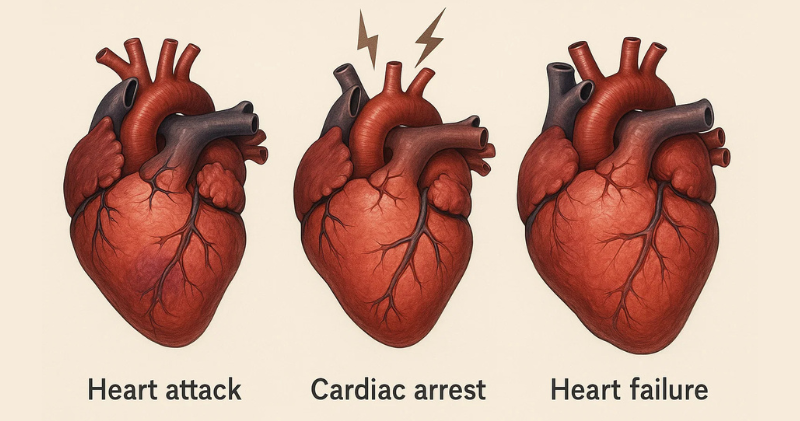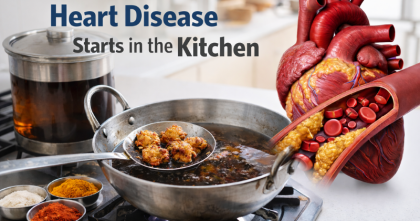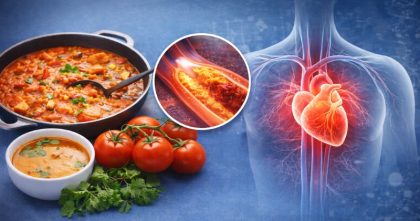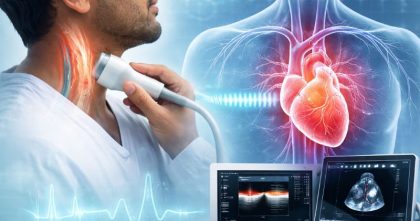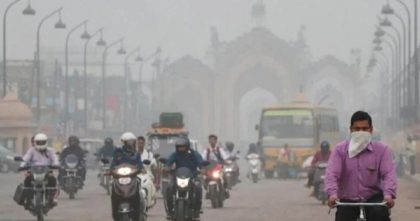Heart attack. Cardiac arrest. Heart failure. They all sound the same — but they’re very different. And knowing the difference could help you save a life.
Many South Asian families use these terms interchangeably. We might say, “Uncle had a heart attack” when he actually experienced heart failure, or confuse cardiac arrest with a heart attack. This confusion can lead to delays in treatment or misunderstandings about what’s happening to our loved ones.
Let’s clear up the confusion with simple, easy-to-understand explanations.
What Is a Heart Attack?
Think: Blood Flow Blocked
A heart attack happens when blood flow to part of the heart is blocked, usually by a clot or plaque in a coronary artery.
What Happens:
- The heart keeps beating
- A part of the heart muscle isn’t getting oxygen
- That section of the muscle may start to die without quick treatment
Symptoms:
- Chest pain or pressure (squeezing, heaviness)
- Pain that spreads to jaw, back, or left arm
- Shortness of breath, nausea, cold sweat
Like a clogged fuel pipe — the engine is running, but one part is starving.
Heart attacks are common among South Asians and often occur 10 years earlier than in other populations.
What Is Cardiac Arrest?
Think: Heart Suddenly Stops
Cardiac arrest happens when the heart suddenly stops beating. It’s caused by an electrical malfunction, not a blockage.
What Happens:
- The heart stops beating completely
- The person collapses and becomes unresponsive
- They stop breathing or may gasp
- No pulse can be felt
What It Looks Like:
- No warning in many cases
- Person was talking one minute, unconscious the next
Like pulling the plug — the power cuts off instantly.
Unless CPR or a defibrillator is used within minutes, the person will die.
The American Heart Association says early CPR can double or triple survival chances.
What Is Heart Failure?
Think: Weak Pump Over Time
Heart failure doesn’t mean your heart has stopped. It means your heart is too weak or stiff to pump blood properly. It develops slowly over time
What Happens:
- The heart is still beating but struggles to meet the body’s needs
- Fluid can back up into the lungs, legs, or belly
It’s a chronic condition that needs ongoing management
Symptoms:
- Swollen feet, legs, or belly
- Shortness of breath when lying down
- Constant tiredness or fatigue
- Weight gain from fluid buildup
- Needing extra pillows to sleep
Like a tired water pump — still running, but not strong enough to do the job.
Many South Asians live with heart failure for years without knowing it, often blaming symptoms on aging or stress.
Quick Comparison Table
| Feature | Heart Attack | Cardiac Arrest | Heart Failure |
|---|---|---|---|
| Cause | Blocked artery (blood flow issue) | Electrical failure (no heartbeat) | Weak pump (chronic weakness) |
| Onset | Sudden or gradual chest pain | Sudden collapse | Slow progression over time |
| Main Symptom | Chest pain, shortness of breath | No pulse, no breathing | Fatigue, swelling, breathlessness |
| Emergency? | Yes – hospital immediately | Yes – CPR/AED required now | Serious, needs medical management |
| Outcome? | Treatable if caught early | Fatal unless CPR started quickly | Manageable with long-term care |
Why This Matters More for South Asians
- South Asians have higher rates of heart disease
- Heart attacks often occur 10 years earlier
- Heart failure symptoms are often ignored or mistaken for aging
- Cardiac arrest survival is lower due to delays in CPR and AED access
The NHS and AHA report that South Asians are 50% more likely to die from heart-related causes.
What To Do in Each Case
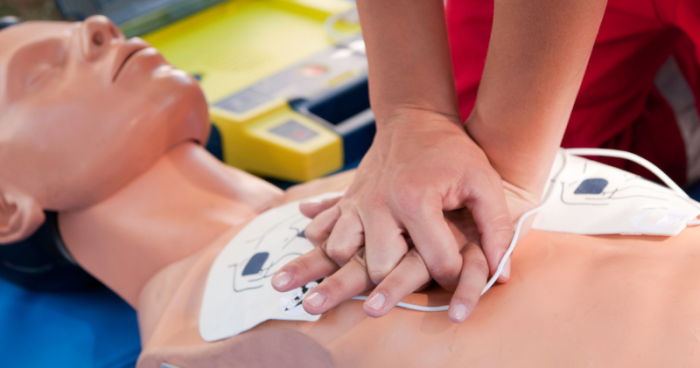
Heart Attack:
- Call emergency services immediately
- Have the person sit or lie down
- Give aspirin if advised and not allergic
- Stay calm and monitor breathing
Cardiac Arrest:
- Call emergency services and start CPR immediately
- Use an AED if available
- Push hard and fast in the center of the chest (100+ beats/min)
Heart Failure:
- See a doctor for testing (BNP, ECG, Echo)
- Take medications as prescribed
- Track daily weight
- Lower salt intake and monitor swelling
Final Thought
Understanding the difference between heart attack, cardiac arrest, and heart failure could save a life — maybe your parent’s, or your own.
Share this with your family. Talk about it. Save it. The more we know, the stronger we grow.
Remember: these are treatable and survivable if recognized early and acted upon.
Sources: American Heart Association, Mayo Clinic, Cleveland Clinic, NHS (UK)
